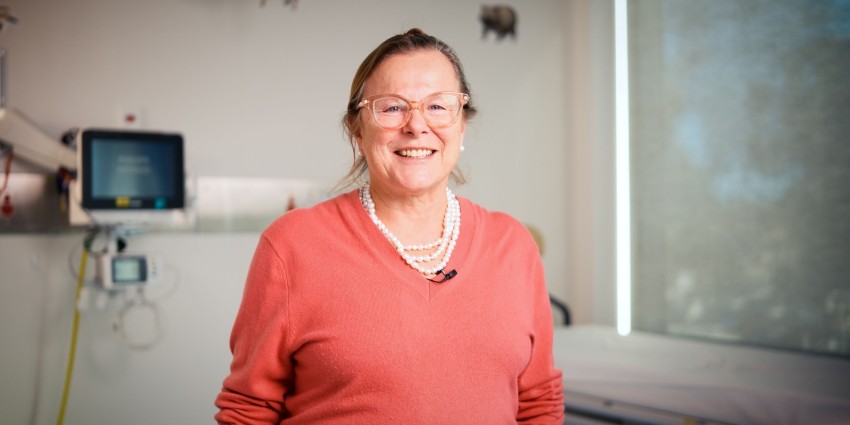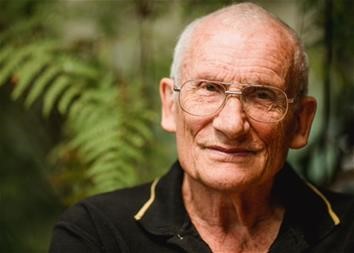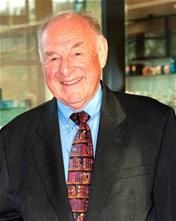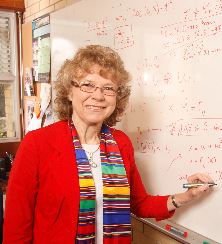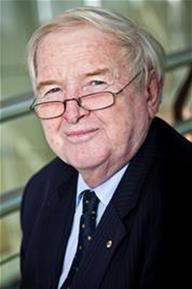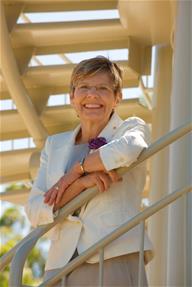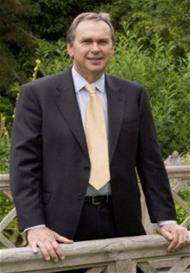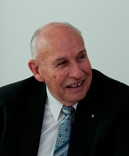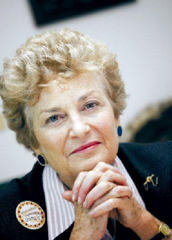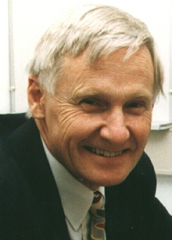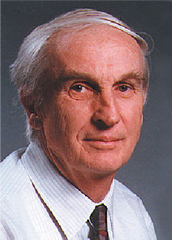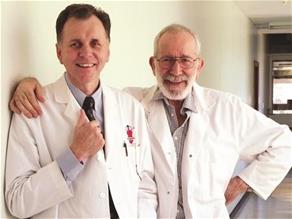Congratulations to the 2024 inductees to the Western Australian Science Hall of Fame. Learn more about Professor Peter Quinn and Winthrop Professor Fiona Wood AO.
The Western Australian Science Hall of Fame recognises exceptional lifelong contributions to science, technology, engineering or mathematics (STEM).
Since 2007, 20 Western Australians have been inducted into the Hall of Fame, including Nobel Laureate Emeritus Professor Barry Marshall AC, Nobel Laureate Emeritus Professor Robin Warren AC, Professor Fiona Stanley AC and Emeritus Professor David Blair.
Read on below to find out more about the WA Science Hall of Fame inductees.
John Curtin Distinguished Professor Igor Bray AM
Show moreWith an academic career spanning 35 years, Professor Bray is regarded as a world-leader in the field of atomic and molecular collision physics, and has been recognised with national and international awards and accolades, including becoming a full professor before the age of forty. His research spans from the fundamental to the applied, and he is responsible for several major paradigm shifting research breakthroughs throughout his career, including the development of the convergent close-coupling computational approach to atomic and molecular collisions, which are ubiquitous throughout the universe and have many applications in science and industry.
Professor Bray has co-authored over 500 publications, been invited to deliver over 50 talks at international conferences, and represented Australia on a range of scientific committees. He has been awarded five prestigious personal fellowships by the Australian Research Council (ARC), won an ARC Centre of Excellence for Antimatter-Matter Studies, as well as ten ARC Discovery grants. In addition to this, Professor Bray has also received funding from the United States Air Office of Scientific Research, and over the last 25 years, has continued to be involved with Coordinated Research Projects run by the International Atomic Energy Agency. Professor Bray also reviews submitted manuscripts for the world's top Physics journals, assesses proposals from many international funding agencies, and reviews the performance of major organisations such as Harvard's Institute for Theoretical Atomic and Molecular Physics.
Mentorship is at the heart of Professor Bray's activities. As Head of Curtin University's Department of Physics and Astronomy since 2010, Professor Bray transformed the Department to a highly research-active one, where student participation is integral throughout their studies. His extensive engagement with high school students over the last 20 years has included annual work experience sessions for classes to engage in hands-on research activities in the areas of computational physics, astrophysics and materials science.
Professor Bray is highly engaged in and has provided significant leadership around educational policy issues in Western Australia since 2001, including the more recent review of the Western Australian Physics Australian Tertiary Admission Rank Curriculum in his capacity as a member of the School Curriculum and Standard Authority's Curriculum Advisory Committee.
Emeritus Professor Richard Hobbs
Show moreEmeritus Professor Richard Hobbs has made an outstanding contribution to the development and application of ecology, locally, nationally and internationally over the past 37 years. He is recognised as a thought leader in the applied fields of conservation biology and restoration ecology, laying foundations for the development of these fields, particularly in the face of ongoing environmental and climate changes. His leading work in exploring and developing the concept of novel ecosystems and the idea of systemic ecosystem interventions has led to major new research efforts in these areas.
Emeritus Professor Hobbs’ evidence-based approach to questioning existing paradigms and approaches has led to radical overhauls of practice and policy across urban, industrial, resource, agriculture and natural biodiversity assets in Western Australia and more widely. Examples are the development of a landscape management approach in the fragmented systems of the Wheatbelt and improved methods for setting and achieving restoration goals. Emeritus Professor Hobbs has often been critical of prevailing policies, such as the Regional Forest Agreement process in the 1990s and current environmental offsets policy.
Emeritus Professor Hobbs is a prolific author, with career publications including 20 books, 327 journal papers and 145 edited book chapters. He has provided exemplary mentorship to the next generation of ecologists, supervising 42 PhD and Masters by Research students to completion. Emeritus Professor Hobbs engages in outreach by regularly talking to community groups and local authorities, and writing communication and practitioner-oriented materials. He is a Fellow of the Australian Academy of Science, has held an Australian Laureate Fellowship and received numerous national and international awards.
Emeritus Professor Mark Randolph
Show moreEmeritus Professor Mark Randolph has been Professor of Civil Engineering at UWA for over 30 years, becoming one of the most highly cited geotechnical engineers in the world.
Drawn to Perth by the challenges of designing foundations in the calcareous seabed sediments surrounding Australia, he established the world-leading Centre for Offshore Foundation Systems at UWA in 1997 and in parallel was a Co-Founding Director of specialist consultancy Advanced Geomechanics. This symbiotic relationship between academia and industry led to involvement with almost all major developments on the North-West Shelf, as well as many novel design solutions for foundations, anchors and pipelines.
Among many accolades, including WA Scientist of the Year in 2013, Emeritus Professor Randolph was elected a Fellow of the Royal Society of London in 2011.
Emeritus Professor Carol Bower
Show moreEmeritus Professor Carol Bower is an internationally recognised public health researcher. She has worked predominantly with the Telethon Kids Institute (previously the WA Institute for Child Health Research), of which she was a founding researcher and where she is currently Senior Principal Research Fellow, and Director of the Fetal Alcohol Spectrum Disorder (FASD) Research Australia – Centre for Research Excellence.
Throughout her career, Emeritus Professor Bower led a series of projects which have had a profound impact on the health of children in Western Australia and beyond. In 1980 she established Australia’s first birth defects registry (an internationally recognised model later implemented in other States). She uncovered the link between low dietary folate and neural tube defects (NTD) such as spina bifida and instigated the world’s first public health campaign to encourage periconceptional folic acid supplementation to prevent NTD.
Having led another study demonstrating that health education alone was insufficient, Emeritus Professor Bower successfully lobbied for national mandatory fortification of flour with folate – a change which has dramatically reduced the incidence of NTDs and saved more than 400 Western Australian children alone from debilitating and deadly birth defects.
Emeritus Professor Bower has been equally persistent in relation to community outreach, actively forging partnerships with consumers, government, justice and health professionals to facilitate, communicate and translate paradigm-shifting research on alcohol-related harm. This includes her supervision of the recent Banksia Hill Project – the first study in Australia to assess and diagnose young people in a youth custodial setting for FASD.
Emeritus Professor Bower’s dedication to community service is reflected in multiple awards in recognition of her good practice and initiatives relating to consumer and community participation in research.
As a long-serving member of multiple paediatric research committees, Emeritus Professor Bower continues her contribution to science and the wider community by advancing and sharing research on child health and development.
Emeritus Professor David Blair
Show moreProfessor Blair is an experimental physicist renowned for pioneering a number of precision measurement techniques used for ultra-sensitive displacement measurements, exceptionally low noise clocks and oscillators, and gravitational wave research.
His career has focused on the direct detection of gravitational waves first predicted by Albert Einstein in 1916 as part of his famous Theory of General Relativity. He led the establishment of the Australian International Gravitational Research Centre at Gingin, part of the School of Physics at the University of Western Australia, and the Australian Consortium for Interferometric Gravitational Astronomy.
Professor Blair’s work at the Research Centre contributed to the international Laser Interferometer Gravitational-Wave Observatory (LIGO) scientific collaboration through developing technology to teach supercomputers to ‘hear’ the special sounds of gravity waves and rapidly detect the signals. He also contributed to the identification and resolution of the issue of ‘parametric instability’ in large US twin detectors at observatories in Louisiana and Washington State, enabling the world’s first direct observations of gravitational waves in 2015. This discovery resulted in a Nobel prize in physics for 3 leading LIGO American physicists in 2017 and was described as ‘a discovery that shook the world’.
Professor Blair’s research has ensured that Australia, and Western Australia in particular, has a high profile in the international gravitational wave community. He has supervised an impressive 74 postgraduate students since 1987 and his students have gone on to successful careers and senior positions in areas including physics and astronomy.
He also led the planning and development of the Gravity Discovery Centre, a major education and public outreach facility which includes the Gingin Observatory.
In 2005, he and Emeritus Professor John De Laeter AO were awarded the Australian Government Eureka Prize for Promoting Understanding in Science in recognition of these science outreach activities.
Professor Blair was the recipient of the WA Scientist of the Year award in 2007, was elected as Fellow of the American Physical Society in 2014, and in May 2018 was elected as Fellow of the Australian Academy of Science, an organisation of individuals recognised for their outstanding contributions to science and research.
After retiring as Director of the Australian International Gravitational Research Centre in late 2017, Professor Blair continues to contribute to the physics community as Emeritus Professor at the University of WA and as the Outreach Program Leader at the ARC Centre of Excellence for Gravitational Wave Discovery. He is currently supervising 10 PhD students and continues to find ways of communicating Einsteinian physics to the wider community.
Emeritus Professor John Pate AM
Show moreEmeritus Professor John Pate AM has greatly influenced plant science, particularly plant ecology and physiology, in Western Australia.
His academic career commenced as Assistant Lecturer at Queens University in Ireland in 1954 followed by increasing senior academic appointments including at the University of Sydney and The University of Western Australia (UWA). He was head of the botany department at UWA from 1974 to 1986.
The major focus of his work concerned the carbon and nitrogen economies of plants, especially legumes, and contributed to applied research on the productivity of pastures and crops. Along the way, techniques were developed for quantifying nitrogen inputs of legumes, thereby permitting assessment of their contributions in agricultural and natural ecosystems.
Emeritus Professor Pate has also contributed significantly to ecological and physiological studies of native WA flora, particularly on the structural and functional adaptations displayed for combating various forms of environmental stress. Emeritus Professor Pate has published extensively with over 500 publications including books, monographs, reviews and refereed research articles. Emeritus Professor Pate was also an excellent supervisor of research students. His students recall him as relentless in the pursuit of knowledge about how plants worked and with an energy, enthusiasm and humour that engaged and inspired many.
Emeritus Professor Pate’s scientific career was honoured by election to the Australian Academy of Sciences in 1980 and to the Royal Society, London in 1985.
Professor Ian Ritchie AO
Show moreProfessor Ritchie was a distinguished scientist, educator and community leader. He was a champion of chemistry and its role in the community, and prominently reshaped Western Australia’s scientific landscape by championing a practical, business-focused approach to science.
He supported the retention and renewal of the WA Chemistry Centre. As a key government advisor and foundation board chair, he guided its transformation to the now world-class ‘ChemCentre’. He was also instrumental in establishing Perth as an international hub of research in hydrometallurgy. He was the driving force behind the establishment of the AJ Parker Cooperative Research Centre for Hydrometallurgy in 1992 and served as its Director until his retirement in 2001.
Under his leadership, the Centre grew to become the world’s leading, and largest, organisation for hydrometallurgical research.
He was a founding member of the WA Premier’s Science Council and the Scientific Advisory Committee to the WA Clean Air Council, where he was the first to advocate for a ban on lead in petrol.
In 2003 he was the second recipient of the Premier's Prize for Achievement in Science, now the Scientist of the Year award. He was awarded WA Citizen of the Year in 1997 and was made an Officer of the Order of Australia in 2014.
Professor Ritchie passed away on 12 August 2014.
Emeritus Professor Cheryl E Praeger AM
Show moreEmeritus Professor Cheryl E Praeger AM is one of the world's most highly cited mathematicians and has published over 360 articles and 4 books.
Professor Praeger is famous for her work on algorithms for computing with matrix groups, especially the Neumann-Praeger SL-recognition algorithm which launched the international matrix group recognition project. Many of her algorithms have been incorporated into powerful computer algebra systems which have transformed the way in which algebra is taught and researched. Her ground-breaking work includes pioneering research into symmetry in graphical models which have far-ranging applications, such as enabling search engines to retrieve information efficiently from the World Wide Web.
She is the Vice President of the International Commission for Mathematical Instruction, and Chair of the Australian Mathematics Olympiad Committee. Past positions she has held include foundation board member of the Australian Mathematics Trust, member of the Australian Research Council College of Experts, president of the Australian Mathematical Society, and Chair of the Australian Council of Heads of Mathematical Sciences.
Professor Praeger promotes and supports the involvement of women in mathematics. The Australian Mathematical Society funds the Cheryl E. Praeger Travel Awards, a travel award named in her honour, designed to provide full or partial support for Australian female mathematicians to attend conferences or to visit collaborators.
She also encourages girls in primary and secondary schools with lectures, workshops and conferences.
Emeritus Professor Alan Robson AO
Show moreAs one of Australia's leading science education figures, Professor Robson has held many distinguished positions including Vice Chancellor of The University of Western Australia.
An agricultural scientist, his early research on the mineral nutrition of plants and soil fertility contributed to the prosperity of farming communities and the continued success of Western Australia's lucrative grains industry.
He counts his impact on graduate students and their subsequent contributions to science and agriculture as one of his greatest achievements. He has received a number of accolades, including the Australian Medal of Agricultural Science, the Fiona Stanley Medal and Officer of the Order of Australia.
Emeritus Professor Lyn Beazley AO
Show moreEmeritus Professor Lyn Beazley AO was the Chief Scientist of Western Australia from 2006 until 2013. In this role, she was a tireless national and international ambassador for science and science engagement in WA.
Professor Beazley undertook her undergraduate studies at Oxford University and her doctorate at Edinburgh University.
Over a 30-year research career, she built up an internationally renowned research team that focused on recovery from brain damage. Her research also changed clinical practice in the treatment of infants at risk from pre-term delivery. She was awarded an Order of Australia in 2009 for service to medical science and her contribution to the development of science policy in WA.
Professor Stephen Hopper AC FLS FTSE
Show moreProfessor Hopper is an internationally acclaimed plant conservation biologist who has made an outstanding contribution to biodiversity preservation in Western Australia. He has made significant improvements to a number of the WA's conservation programs and infrastructure.
In 2012 he was named a Companion of the Order of Australia for his service as a global science leader.
Professor Hopper served as the Director of the Royal Botanic Gardens, Kew from 2006 to 2012. In this role, he led the development and implementation of a forward 10-year Breathing Planet Program for Kew and its global partners. The Millennium Seed Bank Project was a key part of this program.
Dr Bernard Bowen AM
Show moreIn a long and distinguished career, Dr Bernard Bowen made a significant contribution to fisheries research, marine resource management, environmental protection and radio astronomy in Western Australia.
Dr Bowen held the position of Director of the Department of Fisheries for 23 years and chaired many committees in the science field at a state, national and international level.
He played a significant role in the development of the WA Fisheries and Marine Research Laboratories, the WA Wildlife Research Centre, the WA Marine Science Institution and the International Centre for Radio Astronomy Research. In 1991, Dr Bowen was appointed as a Member of the Order of Australia for his services to the fishing industry.
Professor Fiona Stanley AC
Show moreProfessor Fiona Stanley is known for her work on Cerebral Palsy and children's health. She is an advocate for the needs of children and their families and promotes the importance of using population data to provide significant health, social and economic benefits to the community. She is the founding director of the Telethon Institute for Child Health Research.
The Fiona Stanley Hospital in Murdoch is named in honour of her achievements. Professor Stanley was named Australian of the Year in 2003, was honoured as a National Living Treasure by the National Trust in 2004 and is the UNICEF Australia Ambassador for Early Childhood Development.
Professor Ian Constable AO
Show moreProfessor Ian Constable AO is recognised as one of the world's leading ophthalmic surgeons. He is the founder and director of the Lions Eye Institute, now the largest eye research institute in the southern hemisphere and dedicated to the investigation, prevention and cure of blinding eye disease.
With Professor Constable at the lead, the Lions Eye Institute has made many groundbreaking developments, including the Lions Eye Institute artificial cornea which is granting sight to people around the world.
Professor Constable served on the Premier's Science and Innovation Council and the WA Science and Innovation Council as the Deputy Chair. He is also the founding director of The University of Western Australia's Centre for Ophthalmology and Visual Science.
Emeritus Professor John de Laeter AO
Show moreProfessor John de Laeter was a physicist who made a significant contribution to science in Western Australia. In addition to leading groundbreaking research, he also negotiated several visionary projects. These include the establishment of Technology Park, the Curtin Science and Mathematics Education Centre, Scitech and the Gravity Discovery Centre.
In recognition of his contributions, Professor de Laeter was named an Officer of the Order of Australia, a Fellow of the Australian Academy of Technological Sciences and Engineering and an Honorary Doctor of Technology from Curtin University.
Over his long-standing tenure with Curtin University, Professor de Laeter held several senior academic positions, including Deputy Vice-Chancellor of Research and Development. The John de Laeter Centre for Mass Spectrometry was named by Curtin University in recognition of his contributions.
Scitech; Nobel Laureate Emeritus Professor Barry Marshall AC; and Nobel Laureate Emeritus Professor Robin Warren AC
Show moreWith its mission to increase Western Australian's interest and participation in science and technology over the past 25 years, Scitech was selected as an Inaugural Inductee of the Science Hall of Fame.
Emeritus Professor Marshall and Emeritus Professor Warren were recognised for their dedicated service to research when, in 2005, they were awarded the Nobel Prize for Medicine and Physiology.
They discovered the bacterium Helicobacter pylori as a cause of gastritis and peptic ulcer disease. Thanks to the pioneering discovery by Professor Marshall and Professor Warren, peptic ulcer disease is no longer a chronic, frequently disabling condition, but a disease that can be cured by a short regimen of antibiotics and acid secretion inhibitors.




